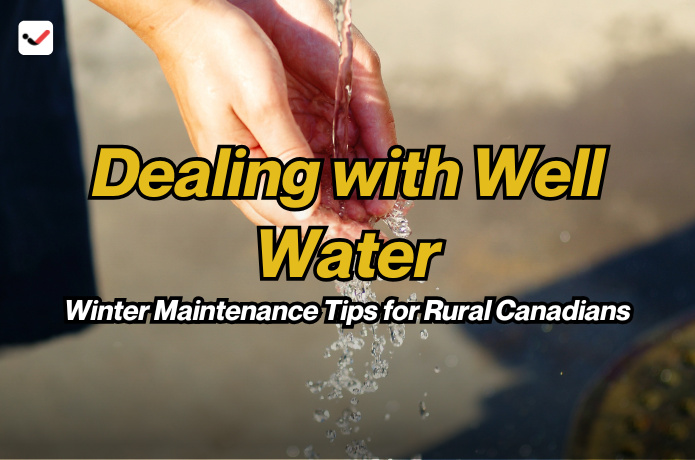Dealing with Well Water: Winter Maintenance Tips for Rural Canadians
Dealing with Well Water: Winter Maintenance Tips for Rural Canadians

For many rural Canadians, a private well is the primary source of water. While wells provide an essential resource year-round, they require special attention during the winter months. Cold temperatures, snow, and ice can create challenges that affect water flow, quality, and equipment performance. Proper maintenance is crucial to ensure your water supply remains safe and reliable throughout the winter.
Taking care of your well during the colder months involves understanding how freezing temperatures impact your system and addressing potential issues early. With a few preventative measures and regular checks, you can avoid frozen pipes, pump failures, and contamination. In this guide, we’ll explore practical tips to help rural homeowners protect their wells during winter and maintain a consistent water supply.
Insulate and Protect Your Wellhead
The wellhead is a critical part of your water system and must be shielded from freezing temperatures. Check for any cracks or gaps in the well cap and ensure it fits securely to prevent snow or debris from entering. Using foam insulation or a specially designed well cover can provide extra protection against the cold.
Keep the area around your wellhead clear of snow and ice to allow for easy access and to reduce pressure on the structure. Piling snow against the wellhead can trap moisture, which may freeze and damage the well components. Regular inspections of the wellhead can help catch minor issues before they become major problems.
Prevent Freezing Pipes
Frozen pipes are one of the most common winter challenges for well water systems. When water inside pipes freezes, it expands and can cause the pipes to crack or burst. To avoid this, insulate all exposed pipes with foam sleeves or heat tape, paying close attention to areas where pipes are located above ground or in unheated spaces like basements or crawl spaces.
If your pipes are prone to freezing, consider installing a pipe heating cable that automatically turns on when temperatures drop. Letting a small trickle of water run from a faucet during extremely cold weather can also help prevent freezing, as moving water is less likely to freeze. Be sure to identify the shut-off valve for your well system so you can act quickly if a pipe does burst.
Maintain Your Well Pump
The well pump is essential for drawing water from the well and delivering it to your home. In freezing conditions, pumps located above ground are at risk of damage. To keep your pump functioning properly, insulate the pump house or any area where the pump is installed. You can use heat lamps or small space heaters to maintain a stable temperature, but always prioritize safety to avoid fire hazards.
If your well pump stops working, check for signs of freezing in the pipes leading to and from the pump. Thawing frozen pipes carefully with a hairdryer or heat tape can restore water flow, but avoid using open flames or extreme heat sources, which can cause further damage. Regular servicing of your pump by a professional can help prevent unexpected breakdowns during winter.
Test Your Water Quality
Winter can affect the quality of your well water, as melting snow and ice may introduce contaminants like bacteria, nitrates, and chemicals into the groundwater. Testing your water regularly, especially after heavy snowfall or a thaw, ensures it remains safe for consumption. Home testing kits are a convenient option, but for accurate results, consider sending a sample to a certified lab.
If tests reveal any contamination, take immediate action by disinfecting the well or installing a water treatment system such as a UV purifier or filtration unit. Keeping your wellhead sealed and clear of runoff from nearby driveways or livestock areas can also reduce the risk of contamination.
Keep Backup Power Ready
Power outages are common in rural areas during winter storms, and they can disrupt your well water supply since most pumps rely on electricity. Having a backup power source, such as a generator, can ensure your water system continues to function during an outage. Be sure to test your generator periodically and keep enough fuel on hand for emergencies.
When using a generator, follow safety guidelines to avoid carbon monoxide poisoning. Install the generator in a well-ventilated area, away from your home. You may also want to consult an electrician to ensure your generator is correctly wired to power your well pump.
Inspect the Well Regularly
Routine inspections can help you spot issues before they escalate. Check your well system for signs of wear and tear, such as rusted components, leaks, or reduced water pressure. Look for any changes in the water’s taste, smell, or clarity, as these may indicate a problem with your well.
Performing a detailed inspection at least once a season can save you time and money in the long run. If you notice any unusual issues, consult a licensed well technician for a professional assessment.
Preventive Maintenance Tips
Preventive measures can extend the life of your well and reduce the likelihood of winter-related issues. Here are a few additional tips:
1. Drain Outdoor Faucets and Hoses: Remove hoses from outdoor faucets and drain any remaining water to prevent freezing.
2. Check the Pressure Tank: Inspect the pressure tank for leaks or other problems that could affect water delivery.
3. Seal Openings in Well Housing: Use weatherproof sealant to close any gaps in your well housing.
4. Monitor Your System: Install a pressure gauge or temperature monitor to track your well system’s performance and detect potential problems early.
Know When to Call a Professional
While many winter maintenance tasks can be handled by homeowners, some issues require expert attention. Persistent freezing, unusual noises from the pump, or contaminated water are signs you should contact a licensed well technician. Professionals have the tools and expertise to diagnose and fix complex problems, ensuring your water system operates efficiently.
Having an annual maintenance check by a qualified technician can also provide peace of mind and help prevent costly repairs. Ask your technician for tips specific to your well type and location.
Maintaining a well water system during a Canadian winter requires preparation and diligence. By insulating pipes, testing water quality, and inspecting your well system regularly, you can protect your water supply from common winter challenges. Backup power solutions and professional maintenance further ensure your well operates smoothly all season long.
With these practical steps, rural Canadians can enjoy reliable and safe well water throughout the winter months. Investing time in preventive maintenance not only safeguards your water system but also provides peace of mind for the colder days ahead.

